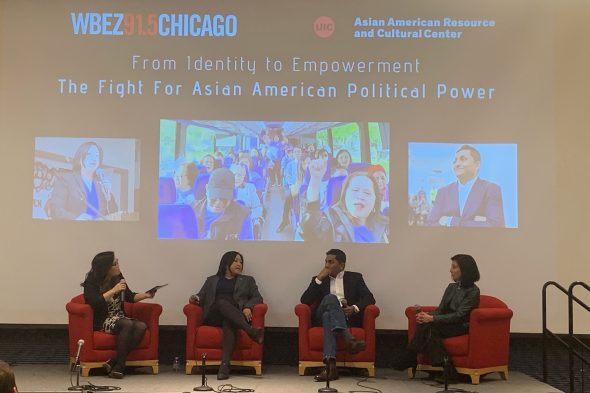Panel calls for more Asian American representation in politics

The University of Illinois at Chicago recently hosted a WBEZ panel discussion, “From Identity to Empowerment: The Fight for Asian American Political Power,” where more than 150 people listened to experts who said that in spite of the growing numbers of Asian Americans, there is a need for more representation in political office.
Esther Yoon-Ji Kang, WBEZ’s race, class and communities’ reporter, led a discussion into the past, present and future of Asian American political power in the region. The event featured Asian Americans who had either attained or run for political office and was presented in partnership with UIC’s Asian American Resource and Cultural Center.
Kang said that in spite of being the fastest-growing population in the city, state and nation, the Asian American community is not seeing the same number when it comes to political representation.
She said that even though Andrew Yang, the American-born son of immigrants from Taiwan, is a presidential candidate, there is a dearth of others in political office compared with the population numbers.
“The community is still underrepresented on all levels of government; for instance, in the City Council, we have zero Asian American aldermen out of 50,” Kang said. “We’re now the fastest-growing demographic in the city, the state and the United States.”
The event included a discussion with Ameya Pawar, a former Chicago alderman who ran unsuccessfully for governor and city treasurer, as well as State Rep. Theresa Mah, and Lori Yokoyama, who ran unsuccessfully for Cook County State’s Attorney.
The three discussed the main factors that people who are running for office have to overcome including the stereotype that Asian Americans are the “model minority” who are highly educated, wealthy and not in need of government assistance. Mah, who represents the 2nd district that encompasses Chinatown and Bridgeport, said the stereotype gets in the way because they are not monolithic.
“The idea that this is a community that doesn’t need government assistance is a complete myth,” Mah said.
In addition, Kang also said the notion that Asians are “forever foreigners” because of their appearance and customs, even though they may be native-born or their families have been in the United States for generations. Pawar talked about how even within the same party, during primary fights, Asian American candidates are often smeared by opponents who try to call their allegiance to this country into question.
“The thing I’d like to call out is that it’s ‘OK to do that,’” Pawar said. “That is part of what we need to break down by having more representation and having more people run.”
During the discussion, Yokoyama referenced her own mother’s background when her family was thrown into a Japanese internment camp during World War II, when the topic came up about the struggle to get donors to help fund Asian American candidate’s political campaigns. Yokoyama said her mother made a point of telling her to reach out beyond just having Japanese friends and supporters.
“We, as Asian Americans, aren’t brought up that way, to be out there asking people for donations, but I know if we did there are a lot communities, a lot of business owners and a lot of people, that would support candidates and make donations,” Yokoyama said. “But there just isn’t ‘the ask.’”
A second panel included Andy Kang, executive director of Asian Americans Advancing Justice, or AAAJ, Wasan Kumar, president of UIC’s Indian Student Association, Kristina Tendilla, community activist and former organizer for AAAJ and the National Asian Pacific American Women’s Forum, and Faith Kares, associate director of UIC’s Institute for Research on Race and Public Policy.
Kumar called on his peers on college campuses to get involved to increase the level of participation by Asian Americans in student government as well in the larger political landscape locally and nationally. By having young people involved in campaigns, nonprofits and community efforts will eventually lead to more political representation.
“I think college students really need to become more engaged and more involved,” Kumar said.
Categories
Topics
Asian American, Asian American Resource and Cultural Center, political science, politics
